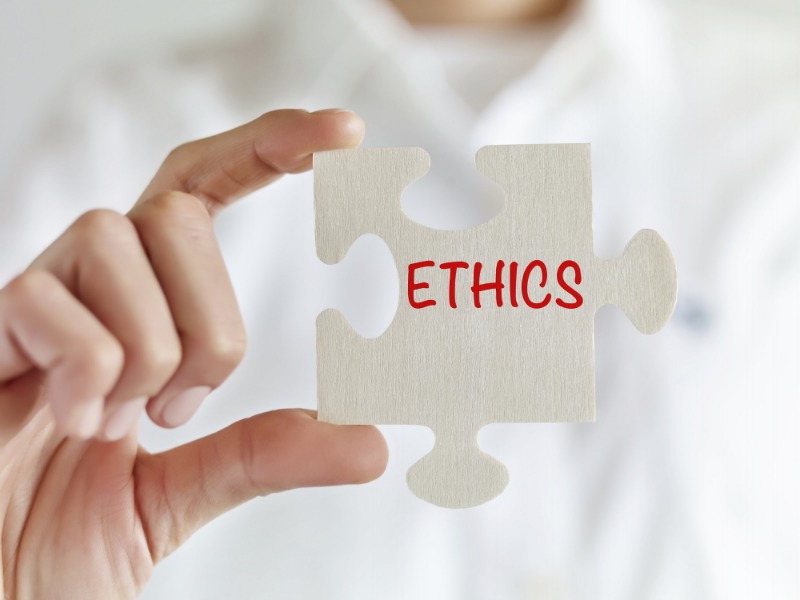What Are Personal Ethics and Why Are They Important

Every person has their own personal beliefs that determine what they believe is right and what they believe is wrong. These principles are known as personal ethics. They play a role in almost every decision that you make inside and outside the workplace.
Every person's code of ethics is unique to them. They influence an individual's behavior and guide their development in various facets of life. Understand how personal ethics play a role in your life and why they are important to you.
The Difference Between Personal and Professional Ethics
Personal ethics and professional ethics are not the same. Personal ethics refer to the ethics that a person identifies with and uses in their everyday life. Professional ethics refer to the ethics that a person must follow during their interactions and business negotiations in their professional life.
A person's personal ethics may mean that they will treat people equally based on their moral code. Professional ethics may mean that you have to treat every customer equally as this is in the company's code of conduct. Both personal and professional ethics can overlap, but it is important to know the difference.
Why Should You Care About Personal Ethics
Personal ethics are important. If you have a respectable code of ethics, more people will want to work with you. Team members will also have more confidence in you and trust you to make the right decisions for an organization.
A solid base of personal ethics will improve your decision-making process too. Knowing what you agree and disagree with allows you to streamline your approach when it comes to making decisions. This applies to both personal and professional ethics.
Lastly, having a strong code of personal ethics can motivate you to complete tasks in the correct manner. Knowing which processes are good and bad to you makes some tasks less challenging. If there is one path that aligns with your personal ethics, you will take it.
Common Personal Ethics
Personal ethics are important. If you have a respectable code of ethics, more people will want to work with you. Team members will also have more confidence in you and trust you to make the right decisions for an organization.
A solid base of personal ethics will improve your decision-making process too. Knowing what you agree and disagree with allows you to streamline your approach when it comes to making decisions. This applies to both personal and professional ethics.
Lastly, having a strong code of personal ethics can motivate you to complete tasks in the correct manner. Knowing which processes are good and bad to you makes some tasks less challenging. If there is one path that aligns with your personal ethics, you will take it.
Common Personal Ethics
When talking about personal ethics, it's best to look at some examples. As everyone is unique, we view the world differently. Even with this, there are still some common personal ethics. Here are some examples.
EmpathyEmpathy is the ability to understand the feeling of what someone else is experiencing. Everyone has a different capacity for empathy as you have to consciously put yourself in the shoes of another person. Having empathy inside and outside of the workplace is of great importance to many people.
EqualityEquality makes sure that every person, no matter their background, should have an equal opportunity to make the most of their lives. A belief in equality will allow you to see everyone on a level playing field where they deserve the same treatment. In other words, all humans have the same moral worth, and this is an important ethic to a lot of people.
HonestyHonesty is an ethic that relates to being truthful in every scenario. Without honesty, there would be nobody left to believe in in the world. Honesty is a valuable ethic that many people share.
IntegrityIntegrity is about an individual upholding their moral principles in any given situation. Standing for what you believe in can always go a long way. People with integrity are often viewed as reliable and responsible.
LoyaltyLoyalty shows how faithful a person is to something. In the professional world, loyalty displays trust and allows for someone to be respected within an organization. Sticking with one employer no matter the situation is a personal ethic that many professionals share.
RespectRespecting the people around you in every environment is a solid personal ethic to have. Understanding people's rights and interests while not discriminating against their religion, race, or sex, is a strong feature of this personal ethic. In a work environment, giving respect to others will facilitate others giving respect to you.
ResponsibilityTaking responsibility for your actions is a strong component of many people's personal ethics. In a work environment, not laying the blame on someone else and taking responsibility garners respect.
SelflessnessPutting other people before yourself is a sign of selflessness. Considering others' needs and prioritizing them will make you a popular and well-respected figure in the workplace. This personal ethic is appreciated and valued by many people.
Final Thoughts
Personal ethics are a key component of personal and professional life. Identify the personal ethics you have and see what your priorities are in life. Write down any goals for the future and see how you can strive to meet them.



